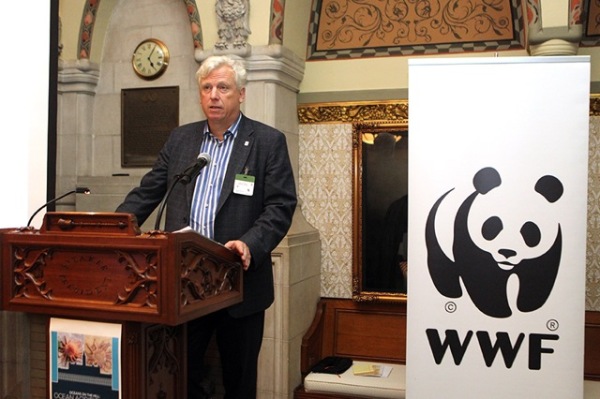The pH is falling! Oysters and economics on the Hill
That’s right – the pH is falling. The pH of our oceans to be exact.
Yesterday afternoon, WWF-Canada and the All Party Ocean Caucus hosted an Oceans on the Hill event to highlight this global issue, which is generally referred to as ocean acidification.
Ocean acidification takes place when carbon dioxide in our atmosphere is absorbed by the ocean, lowering the pH. This naturally occurring process is accelerated by our fossil fuel emissions, resulting in global oceans that are now 26 per cent more acidic than before the industrial revolution.
Parliamentarians, staffers, industry reps, and NGOs gathered in Centre Block to hear from Bill Dewey, Manager of Public Policy and Communications for Taylor Shellfish Farms. Bill came to Parliament to give us an on-the-ground report of ocean acidification’s impacts on the shellfish industry in the Pacific Northwest. As WWF’s CEO David Miller remarked, Bill helped us to “make the connection between the global and the local.”
I come from the dual backgrounds of business and environmental management, so I was pretty excited when I learned that this Oceans on the Hill would not only connect the global to the local, but also provide a real-life, tangible translation of what acidification means for industry.
Oyster farmers in the Pacific Northwest have experienced severe losses in recent years, since the acidification process also means a shortage of the carbonate ions that shellfish larvae need to build their shells. In some areas, there has been a complete failure of wild oyster seed. The industry has been forced to adapt in order to survive.
Listening to Bill’s presentation – to the story of Taylor’s journey – I couldn’t help but recall this simple truth:
Environmental issues are never just environmental issues. Never.
They’re economic issues too. For ocean acidification, this means negative impacts for the shellfish industry in the Pacific Northwest. It means money spent on sophisticated water monitoring and treatment equipment, so that businesses can remain viable. Unchecked, it could also mean up to a trillion dollars a year in global economic losses by the end of the century.
And they’re people issues. For Canadian shellfish farmers and their supply chains, this means jobs in coastal, rural, and Aboriginal communities – many of which are filled by young people. It means opportunities for those communities to combat outward migration and keep people at home. And, most simply, it means the sustainment of a food source that has been an inherent part of coastal living for hundreds of years.
And so perhaps this was the greater message of yesterday’s event – for me, and for all those who attended. A reminder that it’s not environment or economy, as we are sometimes led to believe, but rather environment for economy. Environment for people.
And frankly – whether we’re talking about falling pH or something else – we can no longer afford to think about it any other way.


